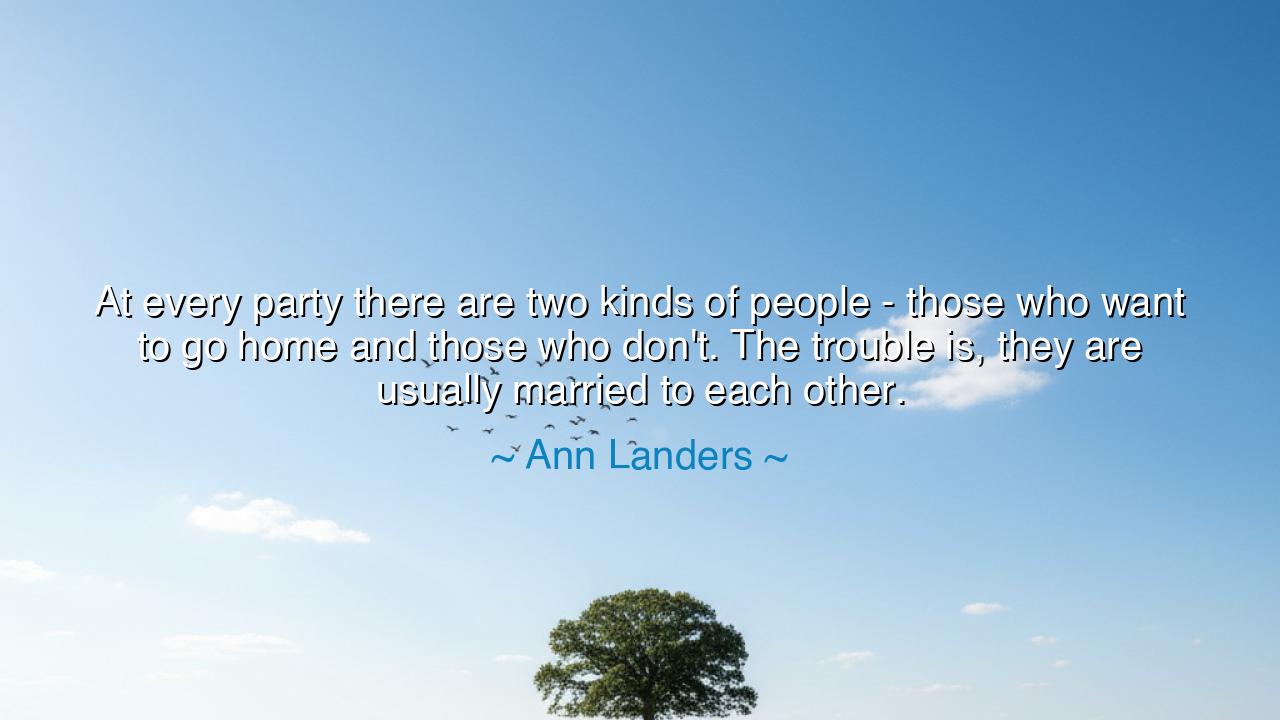
At every party there are two kinds of people - those who want to
At every party there are two kinds of people - those who want to go home and those who don't. The trouble is, they are usually married to each other.






The words of Ann Landers — “At every party there are two kinds of people — those who want to go home and those who don't. The trouble is, they are usually married to each other.” — are spoken with wit and laughter, yet beneath the humor lies a timeless truth about the nature of human companionship. For in this simple observation is hidden the mystery of love itself — how two souls, often so different in spirit, are joined in one shared life. It is both comedy and paradox: that opposites unite, that harmony is forged not from sameness, but from contrast, and that true partnership is the art of balancing desire and restraint, solitude and celebration, silence and laughter.
In these words, Landers captures the eternal dance of difference within unity. One soul yearns for quiet — the sanctuary of home, the stillness where thoughts can breathe. The other hungers for life’s music — the light, the conversation, the endless pulse of human connection. Yet fate, with its mischievous wisdom, often binds such souls together, not to punish them, but to teach them the ways of understanding. For love, if it is to endure, must learn the rhythm of give and take — the humility to stay when one longs to leave, and the tenderness to go when the other is ready to rest.
So it has been since the dawn of time. Even in ancient tales, the gods themselves were divided between fire and water, storm and calm, war and peace. Hera and Zeus quarreled in Olympus, not because they despised each other, but because eternity is too vast for perfect agreement. Yet from their union sprang balance — creation born from conflict, and life sustained by contrast. The wisdom of the ages whispers that it is not sameness that preserves love, but the patience to endure difference, and the grace to see beauty in what is unlike oneself.
Consider the story of Eleanor and Franklin Roosevelt, whose marriage was as full of contrasts as the world they governed. She, a woman of introspection and social conscience, found meaning in quiet service and reflection. He, a man of charm and power, thrived in the light of gatherings and crowds. At times, their spirits seemed to walk in opposite directions — one toward solitude, the other toward society. Yet through years of war and hardship, they remained bound not by similarity, but by shared purpose, learning to respect the differing fires that burned within each heart. Their union became not a mirror, but a partnership — each giving where the other lacked, each strengthening the other’s weakness.
Thus, Landers’ humor is also wisdom: she reminds us that love is not comfort alone. It is often the meeting of contradictions, the marriage of silence and song. The one who wishes to go home needs the one who lingers to remind them that life must be lived, that joy must be shared. And the one who never wishes to leave needs the other to whisper of rest, of the hearth, of peace. Together, they form the full circle of life — motion and stillness, gathering and retreat.
To live well within such a bond, one must practice both compassion and restraint. Let the one who stays be gentle with the one who tires; let the one who yearns for rest be patient with the one who still dances. For the strength of love lies not in having the same desires, but in learning to honor another’s. To love deeply is to recognize that another’s joy need not mirror your own — and that sometimes, love means letting the other stay a little longer, or leave a little sooner.
The lesson, then, is this: harmony is not sameness. It is the weaving together of many colors into one tapestry. Those who love must not seek to erase difference, but to understand it, to cherish it as the place where growth begins. The homebody and the reveler, the quiet heart and the restless one — all have something to teach.
And so, when you find yourself at life’s great “party,” whether in marriage, friendship, or family, remember Ann Landers’ truth. Laugh at your differences, but honor them too. For the real trouble is not that one wishes to go home and the other to stay — it is when neither learns to listen. But if you can listen, if you can love through contrast, then even the smallest quarrels become music, and even the most divided hearts can share one rhythm: the quiet, enduring rhythm of love that lasts.






AAdministratorAdministrator
Welcome, honored guests. Please leave a comment, we will respond soon